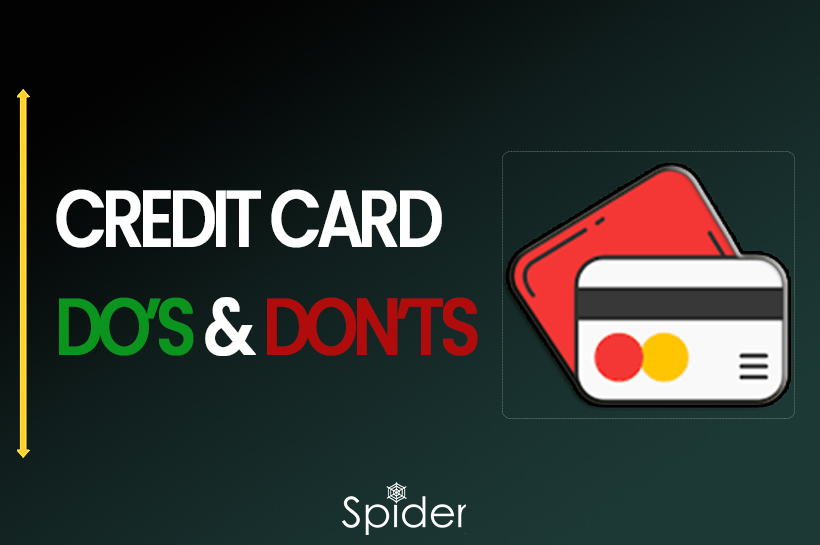Using a credit card can be a convenient and helpful tool for managing your finances, but it’s important to use them responsibly to avoid problems with debt. Here are some tips to help you use your credit cards wisely:
Things To Do while using Credit Card:
(The DO List)

Know your payment due dates:
It can be difficult to manage multiple credit card due dates, but there are ways to make it easier. One option is to reach out to customer service to see if you can change your account’s due date. This can help you spread out your payments and avoid having everything due at the same time.
Another useful tip is to set up automatic payments or bill payment reminders through your financial institution. This can help ensure that you never miss a payment and avoid late fees and interest charges. If you prefer more control over your payments, you can set up bill pay through your bank or credit union and set reminders to pay your bills on time. Remember that paying your credit card balance on time is essential for maintaining good credit and avoiding debt.
Check your statements every month:
It’s important to review your credit card statements every month, even if you’ve set up automatic payments and paperless billing. By checking your statements, you can:
- Verify the accuracy of your transactions: Reviewing your statements can help you identify any unauthorized or fraudulent charges on your account.
- Stay informed about changes to your account: Your credit card company may include important updates, such as changes to your interest rate or rewards program, in your monthly statement.
- Keep track of your balance and estimated interest charges: By reviewing your statement, you can ensure that your balance is accurate and that you understand how interest charges are being calculated.
Remember that monitoring your credit card statements can help you avoid fees and charges, catch fraudulent activity early, and stay on top of your finances.
Keep your payments around 10% of your income:
It’s generally recommended that you keep your credit card payments to around 10% of your take-home income. If your minimum payments on all of your cards exceed this amount, it may be a sign that you’re charging more than you can afford.
If you find yourself in this situation, it’s important to stop charging and balance your budget. Look for areas where you can cut back on expenses to free up some money for paying off your credit card debt. You may also want to consider seeking debt relief options, such as a debt consolidation loan or credit counseling.
Remember that carrying high levels of credit card debt can be expensive and stressful, so it’s important to address the issue as soon as possible. By keeping your credit card payments to a manageable level, you can avoid the risk of falling into a cycle of debt and improve your overall financial well-being.
Things To Avoid while using Credit Card
(The Don’t List)

Don’t run up your balances to the limit:
Running up your credit card balances to the limit can negatively impact both your credit score and your ability to manage debt. Credit scoring uses credit utilization, which measures how much credit you use in comparison to your total available credit limit, as the second most important factor.
To maintain a good credit score, financial experts generally recommend keeping your credit utilization below 30%. This means that you should not use more than 30% of the credit available to you. Ideally, you should strive to keep your credit utilization even lower than that.
Maxing out your credit cards should be avoided if possible because it can lead to high levels of debt, interest charges, and fees that can be challenging to manage and pay off over time. By keeping your credit card balances low and manageable, you can enhance your credit score and reduce the risk of falling into a cycle of debt.
Never use credit as a substitute for income:
Using credit as a substitute for income is a common mistake that can lead to financial distress. If you rely on credit cards to cover your daily expenses because you don’t have enough funds, you’re only masking the underlying problem. This approach can make the situation worse over time.
Credit cards are a form of revolving debt, which means that the minimum payment requirement increases as your balances go up. As you charge daily expenses, your credit card bills increase, leaving less cash flow for other essential expenses. This can create a cycle where you’re forced to make more charges to cover next month’s expenses, leading to a downward spiral that can ultimately result in bankruptcy.
If you find yourself in this situation, it’s important to stop charging and create a budget to manage your finances better. If you’re unable to balance your budget on your own, consider seeking help from a credit counselor who can provide guidance and support. Remember, using credit as a substitute for income is a risky strategy that can have long-term consequences.
Avoid cash advances:
It’s best to avoid cash advances on your credit card. When you use your credit card at an ATM to withdraw cash, you’re essentially borrowing against your available credit line, and you’ll be charged a cash advance fee. Additionally, you’ll also have to pay a special cash advance APR, which is typically much higher than the purchase APR for regular transactions
Cash advances can be an expensive way to get cash, and it’s usually not worth the high fees and interest charges. Instead of relying on cash advances, consider alternative options such as taking out a personal loan, using a line of credit, or seeking help from a financial advisor. Remember, it’s always best to avoid borrowing money whenever possible, and to only use credit cards for purchases that you can afford to pay off in full each month.
Disclaimer: The information provided in this Blog is for educational purposes only and should not be construed as financial advice. Trading in the stock market involves a significant level of risk and can result in both profits and losses. Spider Software & Team does not guarantee any specific outcome or profit from the use of the information provided in this Blog. It is the sole responsibility of the viewer to evaluate their own financial situation and to make their own decisions regarding any investments or trading strategies based on their individual financial goals, risk tolerance, and investment objectives. Spider Software & Team shall not be liable for any loss or damage, including without limitation any indirect, special, incidental or consequential loss or damage, arising from or in connection with the use of this blog or any information contained herein.





